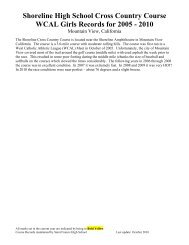January - Saint Francis High School
January - Saint Francis High School
January - Saint Francis High School
You also want an ePaper? Increase the reach of your titles
YUMPU automatically turns print PDFs into web optimized ePapers that Google loves.
UNDERDISCUSSIONWe are mostly strangers in this world. Respect cannotdepend on whether or not we know each other. Jesus callsus to love not just those we know and already love, but tolove our enemies, the strangers, the least among us. Thismeans that the least lovable person you know—or the toughestperson to get along with—is as entitled to your respectas the people you love most in the world.Even the most generous person has trouble with this ruleof respect. We have all encountered people that are hard tolove, including those who threaten us as individuals or as acommunity or as a nation. So what do we do? Well, we areback to rule number one: Our faith calls us to see, in everyface before us, the resemblance to our own face, to the faceof God.3) Showing respect is the only way to prove that we have it.Respect is one of those values that is only as good as theway it is lived out. Respect can certainly be preached anddiscussed—like now—and it certainly can be felt in theheart, but the only way it can be demonstrated is throughpractice. The danger of talking about respect is falling preyto the theory and not living it out. And the first people totell us that we are hypocrites are our children.So how do we live out our belief in respect?First by our words. There is magic in words; words canbuild us up or tear us down. Language, whether it be from afriend, a teacher or a parent, has the power to enrich or destroy.Our children clearly fear our language, and no matter whatwe intend, they will fall back on the old adage: what comesout of the mouth reveals what is in the heart.Second by respecting the rules. We are all fellow travelersin this world. We live by rules out of respect for others. Rulesare a contract between people: obeying the rules means thatwe want to play fair out of respect for others who deserveto be treated with honesty.Teenagers will argue against discipline, but only whenthey perceive that it is unfairly lived out. As much as theyask for freedom and independence, they like to know thatthe playing field is level, that everyone will be treated thesame, and that there will be consequences if someone breaksthe rules. While they may continue to test the rules, theyfully expect to have to live by them. What do they saywhen we don’t enforce our own rules? You’re not fair!And finally, by our actions. Respect, you remember, is anaction, a verb. You need to show it by practicing it. Andbecause we are human, with human flaws, any one of ourstudents could say to us: “Who are you to tell me what todo? You’re not the model of perfection. There is no haloaround your head.” And they are right. We know that wedon’t live up to everything we tell them to do. Sometimeswe don’t even live up to our own rules. Teenagers see alland know all—they watch us for hours at a time. They knowwhen we are being honest and when we are not. They expectus to be respectful, just as we have taught them to be. Whenwe are not, they are disappointed in us.4) Respect requires that we appreciate our differences andvalue those who look, think and act differently than we do.This principle requires that we look beyond ourselvesand learn to respect and appreciate those who are differentthan we are. We all struggle with judging people who look oract or believe differently than we do. And we struggle withthis because their actions or beliefs threaten us: When wejudge them, we are really saying: “You cannot be okay becauseyou’re not like me. If you are okay, then what about me?”Self-centeredness and fear are at the heart of racismand prejudice. As people of God, we must not only acceptour differences, but embrace them. Learning to respect andvalue our differences means that we must look beyond ourselvesand recognize the worth of every person, friend andstranger alike, especially if they are different than we are. Bycelebrating our differences and showing appreciation in oureveryday actions and language, we are practicing principle#3: showing our respect through our actions.5) All respect starts with ourselves.To be able to respect others starts with respecting oneself.Respect doesn’t happen because we decide today to loveothers. It flows from the faith I am loved by God and that Iam made in God’s image.This isn’t the self-love that causes us to be selfish orvain. It isn’t the self-love that makes us arrogant and selfimportant.Rather, it is the love that comes from a belief inour own goodness—the kind of love that generates love forothers and respect for life.It is the kind of love that allows us to stand up for ourvalues and beliefs.It is the kind of love that helps us respect our own bodiesand selves, so that we can say no to destructive behaviorand abuse of drugs and alcohol.It is the kind of love that helps us say no to abuse fromothers that causes us shame and humiliation.It is the kind of love that shows others that you respectyourself as a child of God.If you can only remember one, remember the first principle:the key to respect is to see the face of God in everyone.














